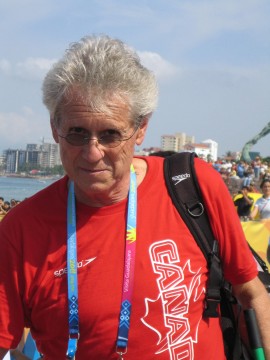With his white, puffy hair, one would never peg Ron Jacks as a Canadian swimming legend. Although Jacks, over the past 50 years, has helped define Canadian swimming as a coach and as a swimmer, he is a modest man.
Born in Winnipeg on Jan. 23, 1948, Jacks began swimming as a child. At the age of 16, he was propelled into the Canadian swimming scene and he continued to race representing Canada until the mid-1970s, setting a total of seven Canadian records throughout his swimming career.
He has succeeded on the international scene as well. Between 1960 and 1972, he raced in three Olympic Games: 1964 Tokyo Olympics, 1968 Mexico Olympics and 1972 Munich Olympics.
In 1966, he attended the British Empire and Commonwealth Games, where he won a gold medal in 110-yards butterfly. In 1970, he attended the British Commonwealth Games, where again he won a medal, this time a bronze in the 100-metres butterfly.
All of this success was followed by Jacks retiring from swimming in 1972 while at the peak of his speed. Jacks was 24 and had been married for three years, so he thought it was time to move on. He was at a point in his swimming career where he felt he had accomplished enough to end it.
“I was lucky to have felt satisfaction with my swimming when I retired,” says Jacks. “I left happy with my accomplishments as a swimmer.”
“I want to help them reach their full potential, and if they’re willing to go for it, then so am I.”
Although Jacks thought he was done with competitive swimming when he hung up his Speedo, he was actually just getting started.
“I never thought about becoming a coach when I was a swimmer,” says Jacks. “I really didn’t have an interest in it.”
But after a break from the pool, with a trip to Africa preceding the 1972 Olympics, it became clear to him that coaching was what he wanted to do simply because he thought he could do a better job than the coaches in Canada.
“I wanted to see if I had more to give than other coaches,” Jacks says. “It was just a competitive urge, similar to racing.”
Jacks was right about his talent as a swim coach: he ended up playing a huge role in the establishment of competitive swimming in B.C. by forming some of B.C.’s most successful swim programs.
“I started coaching at the first club I founded called the Vancouver Pacific Swim Club,” says Jacks. “I wanted to be my own boss.”
After VPSC, Jacks became the head coach of the Hyack Swim Club in New Westminster, where he worked for 10 years.
He then moved to Vancouver Island where he formed Island Swimming, which is now one of Canada’s most successful clubs, with an international reputation for producing some of Canada’s fastest swimmers.
In 2002, Jacks parted ways with Island Swimming, and along with coaches Rod Barratt and Mark Lancaster formed Pacific Coast Swimming, where Jacks is currently the director of swimming. PCS is the sister club to UVic’s varsity team.
Throughout Jacks’s coaching life, he has placed at least a dozen swimmers on the Canadian national team, many of who have gone on to qualify for the Olympics. Jacks has had a swimmer on every Canadian Olympic team since 1976.
“I don’t have a career in coaching,” says Jacks. “Coaching isn’t my job; it’s my life. I do what I like, and I guess that makes me selfish.”
Jacks, now 64, has achieved most everything a coach can achieve in Canadian swimming. He is a member of the Canadian Swimming Hall of Fame, the B.C. Sports Hall of Fame and the Swim B.C. Hall of Fame, and yet he still shows up to the pool every day to coach the kids. Some of the “kids” include 2012 Olympic open-water bronze medalist Richard Weinberger and 2012 Junior Pan Pacific silver medalist Zac Parkes.
“My goal now is to help my swimmers get to where they want to go,” says Jacks. “I want to help them reach their full potential, and if they’re willing to go for it, then so am I.”
Jacks understands the mental and physical game of how to succeed as a swimmer.
“You know you’ve solved the sport of swimming when you can come in last and still do a good job,” says Jacks. “It’s such a simple theory, but so hard to grasp. It really is the key to winning, not just in swimming but in life.”






